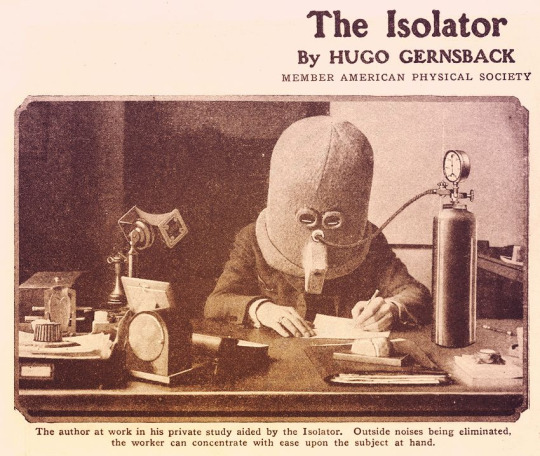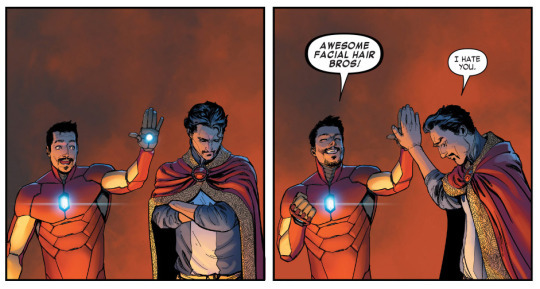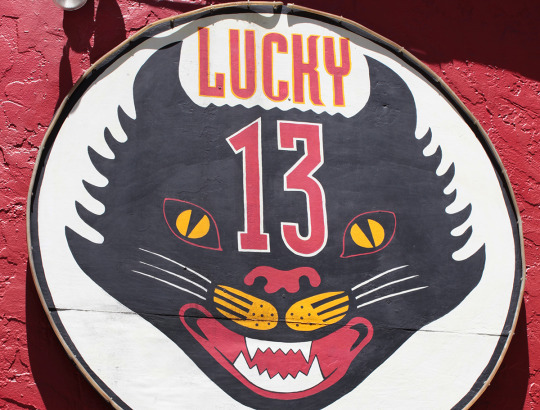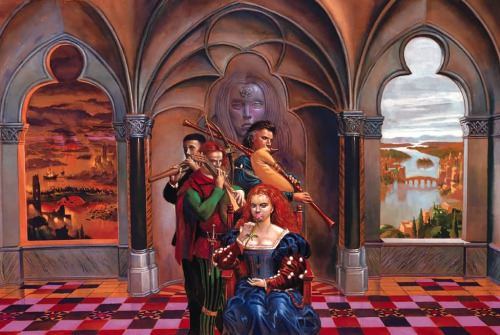Charlie Jane Anders's Blog, page 32
June 8, 2016
Who the fuck is my #DND character?
May 27, 2016
veryauthenticcc:
On sight
May 26, 2016
"The child, screaming for refuge, senses how feeble a shelter the twig hut of grown-up awareness..."
Grownups can deal with scraped knees, dropped ice-cream cones, and lost dollies, but if they suspected the real reasons we cry they would fling us out of their arms in horrified revulsion. Yet we are small and as terrified as we are terrifying in our ferocious appetites.
We need that warm adult stupidity. Even knowing the illusion, we cry and hide in their laps, speaking only of defiled lollipops or lost bears, and getting lollipop or a toy bear’s worth of comfort. We make do with it rather than face alone the cavernous reaches of our skull for which there is no remedy, no safety, no comfort at all. We survive until, by sheer stamina, we escape into the dim innocence of our own adulthood and its forgetfulness.”
- Katherine Dunn, Geek Love.
May 23, 2016
One way of looking at the Hugo Awards mess

So we’re once again having Hugo Awards drama. It’s confusing, because the people who packed the ballot with their choices have a bunch of vague explanations about why they’re upset. (Ranging from “OMG SJWs” and “affirmative action” to “we just want fun stories.”) They generally keep their grievances vague and nebulous (no pun intended), and it’s hard to pin down what they’re upset about. And this year, they changed tactics slightly, putting more “mainstream” choices on the ballot except for some of the short fiction categories.
So I figure one useful way to look at this issue is to ask: What’s changed? If there’s a group of people who are upset, what recent changes could possibly account for their being upset? Here are a few things that occur to me.
1) Short fiction has changed. So one of the frustrating things about discussing this whole Hugo mess has been that novels and short stories get lumped together.
The Hugo Awards only have one novel category, but they have three short fiction categories. And the Puppies have proved that it’s easy to pack Best Novelette and Best Short Story with your own preferences if you have a small group nominating in lockstep, because very few people actually nominate for those.
Fewer people pay attention to short fiction than novels in general, in fact. This is true in literary fiction, as well as genre fiction. And short fiction has always been where more experimental and daring work has happened – and occasionally, one of those more unconventional stories makes it into awards ballots. This has always happened, I think.
But it’s definitely true that short fiction has changed tremendously in the past decade – mainly, because everything has gone digital. Magazines like Clarkesworld, Tor.com and Lightspeed have become much more important, and they get a lot of stories onto ballots. (When the ballots are not stuffed.) There’s also been a changing of the guard at the “Big Three” digests, but the digests still have an incentive to publish stuff that will sell on magazine racks – whereas the online magazines have an incentive to publish stuff that will get passed around on the internet.
The Big Three have also increasingly moved towards iPad-friendly e-book editions that they can sell on Amazon. The internet is where short fiction gets most of its attention nowadays. And it’s reasonable to think that there’s been some change in the type of short fiction that gets published as result, although my recent experience has been that action-oriented, plot-heavy stories are still easy to sell, and people still like them.
2) Book publishing has also changed. Borders went under. Wal-Mart stopped selling most paperbacks. Independent bookstores made a huge comeback. People started reading more e-books, and a lot of the most fun, action-adventure-y novels are being self-published on Amazon now. The midlist is finally, completely, dead, and people who made a comfortable living writing novels that only sold moderately well have been pushed out.
For all that, though, I don’t think the changes in book publishing have been as transformative as what’s happened with short fiction. Because short fiction is a smaller arena, and never had as robust a retail presence – apart from a few big anthologies every year – the move to internet venues was a massive shift, and probably did change the kind of short stories being published in major markets. But to the extent that Clarkesworld is the new Asimov’s, Amazon is the new Ace/Roc. And yet, the same kind of books that were popular a decade ago are still popular – even accounting for fads, and shifting tastes, and all that. Kameron Hurley believes we’re in the middle of a new “New Wave,” but I don’t quite see it – there is a healthy amount of genre-defying, experimental, literary-tinged SF being published, but there was also quite a lot of that in the 1990s and 2000s, what with Slipstream and the New Weird and whatnot.
And book authors who were a big deal 10 years ago are still a big deal. Neal Stephenson and Lois McMaster Bujold are still just as important, and successful, as they ever were. If anything, it’s harder now than ever for a new author to break out, and the field is tilted towards established pros. (In his big piece on “popularity versus awards” in SF, Eric Flint went to a Barnes & Noble and discovered that… established authors who have a huge backlist are taking up a lot of shelf space. But he just proved my point – it’s harder for new authors to break in, because Mercedes Lackey owns half a shelf.)
Anyway, I guess my feeling is that the changes in bookselling would, if anything, make it harder for a bunch of brand new authors, peddling “message fiction,” to take over anything. And the book nominees in the Hugo Awards mostly reflect titles that have done well, and gotten a lot of review attention, in the previous year. Which has always been the case, I think. The “Best Novel” category hasn’t really changed that much in the past decade – except for one important shift:
3) More women getting award nominations. This is the single measurable change to big SF awards that I’m aware of. From 2000-2009, women accounted for roughly 20 percent of the Hugo fiction nominations, but from 2010-2014, women crept up towards parity. This was a huge change, and it’s been totally reversed in 2015 and 2016, thanks to the Puppies. (And the fact that this year’s Nebula winners were all female just proves that there hasn’t been any drop in quality among female writers in 2014 and 2015.)
This year’s Rabid Puppies fiction slate was pretty much male-dominated, except for Bujold. When you look for “What actually changed in the past several years, that might cause a group of people on the internet to feel as though science fiction awards were heading in the wrong direction,” this is the thing that sticks out like a sore thumb.
The Hugos still were not doing a great job of recognizing writers of color, but they did make huge strides towards acknowledging the incredible work that women writers have been doing in genre fiction. And this is the trend that the Puppies have more or less put a stop to. So if I had to put my finger on one thing that seems to be behind the Puppy movement, I wouldn’t reach for “fiction is getting too literary” – even in spite of the changes in short fiction – when there’s another explanation, that’s so obvious and quantifiable.
May 20, 2016
Deleted Scene: Pastor Bob

Here’s another deleted scene! As anyone who’s read All the Birds in the Sky knows, Patricia goes to a special school for witches called Eltisley Maze. It’s actually two different magical schools stuck together – and if you want to know more about how that happened, read this. But originally, there was another teacher at Eltisley Maze, and he was even more unusual than the other teachers in the book. Read for yourself!
So this is a flashback to Patricia’s high school years, in which she spends time with a teacher named Pastor Bob, who teaches Trickster Magic. Pastor Bob’s title isn’t just a funny nickname – he’s an actual Baptist minister who teaches at The Maze part time, and works at a church in Memphis the rest of the time. In the final version of the book, Pastor Bob got absorbed into the character of Kanot, the head teacher at The Maze.
The usual warnings need to be repeated here – this isn’t as polished as the final version of the book, and I cut this stuff out for a reason. (Mostly, just to make the book shorter and flow better, but also just because it worked better otherwise.) Don’t read this deleted scene until you’ve read the actual book! It’s not really representative of the book in its finished form, and I’m just posting it as an interesting extra.
With that out of the way…
There was one weekend when Patricia was supposed to spend
the entire weekend at The Maze untangling the electrical wiring in a cranky old
man’s bungalow. But instead, Pastor Bob invited her to come spend the weekend
in Memphis. “It’s just a few hours away by airship.” They left campus
late Friday afternoon, and touched down in the church parking lot around 7 PM.
The First Baptist Church of North Memphis was a big stucco prow, sailing up out
of the ground, lit by floodlights from below. At first, Patricia thought the
place was deserted, but then Pastor Bob led her down a tiny side staircase to a
basement, where the Friday night soup kitchen was still in full swing.
Pastor Bob walked around the long space, which looked just
like any cruddy basement you’d ever seen except that someone had installed
really nice track lighting. Pastor Bob stopped and talked to maybe a dozen
people, one by one, touching them on the shoulder or hand and listening as much
as talking.
That night, Patricia slept in the spare room in Pastor Bob’s
one-storey house, in the middle of what felt like suburbia but was in the
middle of the city. The next day, they got up early and drove around town in
Pastor Bob’s Lincoln Town Car, visiting his parishoners who were in trouble.
Everybody was in trouble, it seemed like. Most of them in cunning traps, just
as fiendish as anything The Maze had put Patricia through. Patricia spent the
whole time watching to see how Pastor Bob worked his magic – and most of the
time he either didn’t, or it was so subtle you’d swear it hadn’t happened. He
didn’t cure anybody’s COPD or make anybody so they’d never touch alcohol again.
He didn’t magically keep the bank from taking anybody’s house. He offered
little nudges, here and there. Just watching this made Patricia squirm, because
she’d seen this man turn ice into fire into flowers. Mostly, he prayed with
people, to no visible help.
“Why do you just pray with people? Jesus isn’t going to
fix Mrs. Martin’s broken hip, but you could, just like that,” Patricia
said to Pastor Bob in his car after they’d just had the most delicious barbecue
she’d ever tasted, with lots of corn bread and sweet ice tea. Pastor Bob didn’t
answer her, just shrugged, like she wasn’t paying attention.
Later, a couple hours later, Pastor Bob was driving them
down the big wide street where the center lanes randomly changed direction and
you had to watch the big arrow lights overhead to keep track. And he randomly
turned to Patricia at a stop light and said, “The Bible doesn’t talk about
quarks and pulsars, and it doesn’t tell you how to do a shrinking spell. But I
believe it tells us the important things. You ought to respect that.”
Patricia had pretty much gotten it through her head, they
weren’t going to be doing any fancy magic this weekend – this lesson was all
about restraint, or trusting in religion rather than mysticism, or something.
And then around five PM, right when Patricia was ready to slit her wrists, they
visited a house that was being eaten by black mold, on the outskirts of the
North Side. It had probably been a nice house once, but now it looked like an
episode of Hoarders. Only one person lived there, a man named Rodney Mander, even
though there were two and a half bedrooms and signs that a family had been
there. Patricia wanted to stay standing, because there was no surface that
didn’t look toxic. But Pastor Bob made her sit herself down.
Pastor Bob talked to Rodney for an hour or so – about his
constant drinking and occasional meth and crack jags, about his long-gone
family, and the engineering degree from MIT that he was wasting since the
petrochemical plant gone under. Rodney’s face looked hollowed, like a crypt
keeper, in the light from the one teetering lamp in the corner. Patricia was
waiting for Pastor Bob offer Rodney a Band Aid, like everyone else. And then
Pastor Bob said it, right around the time the tears were slickest on Rodney’s
face: “Rodney, what would you give me if I helped you change your
life?”
“Anything,” Rodney sobbed. “Everything.”
“Think carefully now,” said Pastor Bob. “Do
you mean that?”
“Yes,” Rodney cried. “Yes, yes.”
Patricia almost fell out of her chair. This was a classic
Trickster move, the False Bargain. Pastor Bob had just gotten Rodney to agree
to give Pastor Bob everything, in exchange for Pastor Bob helping him to
change. In other words, Rodney would give up all his power, in exchange for
giving up all his power. With that kind of buy-in, Pastor Bob could do almost
anything. He could turn Rodney into a giant reptile, or give himself the power
to fly. Whatever. Instead, of course, Pastor Bob called some volunteers from
the church to come over and clean this place up, and magic made the whole thing
go way faster and easier than it really ought to have. The black mold came
right off the walls. Some of that clutter was worth a small fortune on eBay,
and the church had its own eBay store, taking a cut for itself. Rodney would
never touch drink or drugs again. And Rodney would do whatever Pastor Bob told
him, from this day forward.
“Whoa,” Patricia said when they finally climbed
into the Lincoln Town Car, around three in the morning. “You own that guy
now. You, like, own his soul. Sorry, poor choice of words.”
“I don’t own his soul,” Pastor Bob said, steering
his big boat of a car with his eyes shut. “I just own his life. There’s a
big difference.”
In the morning, a seemingly well-rested Pastor Bob gave a
sermon about miracles, and how the true miracle was the persistence of faith in
the face of wickedness and despair. Twice.
Top image: Baptist Church, photo by Bert Knottenbeld
May 19, 2016
Another Way of Thinking About Genres

So one of the cool things about promoting All the Birds in the Sky has been getting to have lots of interesting conversations about genre with book nerds. And people keep asking me about what it’s like to write a “genre mashup.” I kind of don’t really think of All the Birds in the Sky as a genre mashup, because in the course of writing it I decided to avoid smushing together genre tropes as much as possible.
But still, All the Birds in the Sky definitely has elements of both science fiction and fantasy, and it’s interesting to talk about the meeting of genres. Recently, I was at a bookstore, and someone asked me about this – and two things came to mind that I hadn’t thought of before.
First of all, we all belong to a world that has atomized genres down to so many constituent parts that we no longer see their outlines as distinctly. Anybody who’s gotten sucked into spending hours on TVTropes is intimately familiar with the building blocks of different genre stories, many of which carry across all sorts of genre labels. (The “heel face turn” can happen in space opera just as easily as epic fantasy.) The hyper-awareness of lots of little genre attributes makes it harder to obsess about the big markers, like “does the good guy wear a pointy wizard hat, or a space helmet?”
But also, on a related note, the most popular genres right now transcend fantasy and science fiction. Like, zombies. What the hell are zombies? Maybe you’re going to have some hand-wavey virus that turns people into the living dead, or maybe there’s an evil supernatural force making them unkillable. Either way, they’re kind of sciencey-fantasy-wibbly-wobbly. Post-apocalyptic stories, generally, can be either science fiction or fantasy, depending only on how much time you spend explaining why things ended. Superheroes, too, are both science fiction and fantasy – Dr. Strange can hang out with Iron Man super easily. And so on. We’re attracted to things that are impossible to slap a genre label on.
All of which makes me think that the distinction between fantasy and SF, if it was ever meaningful, is now just kind of whatever. In the 21st century, we no longer think of genre in such broad terms. Just a random thought.
May 18, 2016
Deleted Scene: Patricia tells Laurence about “Aggrandizement”

In All the Birds in the Sky, we find out that the witches have a rule against Aggrandizement, which is sort of “making yourself into a big deal.” And Laurence finds out about this rule when he gets unwillingly roped into trying to help keep Patricia’s ego in check. It’s kind of a weird thing to lay on the poor guy. But in an earlier version of the novel, Patricia tells Laurence about Aggrandizement herself, and they have a whole conversation about it. Yes, it’s another Deleted Scene!
The usual warnings apply – this was cut from the book for a reason. Partly for length reasons, and partly because things flowed better without it. You probably shouldn’t read this unless you’ve read the actual book first. And this scene isn’t necessarily representative of what the book is like.
Also, a bit of scene-setting. When this scene happens, Patricia has just visited her friend Reginald, whom she decided not to cure of AIDS. And she also was assigned to turn a truly horrible person, a rapist, into a cloud of whiskey. She’s feeling conflicted about both of these things – not curing Reginald, and putting a curse on someone. And then she meets Laurence.
A block away from Tartine, Patricia was just shaking the rain out of her hair and black Lucky 13 hoodie when she ran into Laurence, sitting at an outdoor table and staring at an electronic device shaped like a squat apostrophe. She waved at him and he didn’t respond, so she almost kept walking. Then for some reason, she went back and tapped him on the shoulder.
“What’s that?” she asked.
“Oh hey.” Laurence stood up. He hugged her, because apparently they were on hugging terms. “It’s really good to see you. This,” he waved the big guitar pick, “is a Caddy. I just got this one, and I’ve been trying to hack it. There’s something kind of weird about these things. One of them made my girlfriend’s emotional robots have a meltdown.”
Patricia peered at the Caddy, which looked friendly enough – it was offering a swirl of blobs, representing everything from weather report (scattered showers, thanks for the heads up!) to social updates culled from all over the web. Laurence had a friend named Doug who was getting a colonoscopy at this very moment.
“It’s like this device is doing something sneaky, and the robots picked up on it.” Laurence waved her to a seat at his table. “But people should have noticed. I mean jailbreaking these things is practically a sport. So what have you been up to?”
Patricia really ought to have lied or said something innocuous, like “Oh, just the usual.” But she had run into Laurence at the exact moment she needed to talk to someone. And he was the only civilian who knew her secret. So she told him, about how she’d been choosing not to cure an AIDS patient and then giving a rapist a major life change.
“Wow.” Laurence put the Caddy and leaned across the metal lace table, whispering. He was wearing a windbreaker. “So you literally just came from putting a smackdown on someone.”
“Yeah. Like half an hour ago.” Patricia was still cold and wet, and it felt a little weird to be talking about this out in the open, right across from the park. “It’s part of the job. I get assignments, and sometimes they’re just delivering a package. Or helping someone out. And sometimes, I get sent to ruin someone’s day.”
“That’s pretty intense,” Laurence said. “So you’re allowed to put a curse on a rapist, but you’re not allowed to cure your friend? That’s kind of weird.”
“It’s complicated.” Patricia had never talked about any of this stuff to an outsider before. “The main rule of magic is against Aggrandizement, which turns out to be almost anything you’d want to do. Cursing that rapist was okay, because older, wiser wizards told me to. If I cure Reginald, though, that’s on me. And it could be a sign that I’m getting too arrogant. Or it might not. I would have to be very sure I was doing the right thing, for the right reasons.” She glanced at the Caddy and realized that she was supposed to be at work ten minutes ago. “Oh shoot, I’m late. Thanks for listening to me prattle.”
“Absolutely no problem.” As she stood, so did Laurence. “Your problems are way more interesting than almost anybody’s I know. Hey, we should get coffee.”
“Yes. Coffee.” Patricia took off running. As she turned onto Dolores, she looked back and saw Laurence examining the Caddy again, chewing on the soft place between thumbnail and thumbprint.
Image: Torbak Hopper
May 17, 2016
This is the Croatian cover art for Tigana by legendary fantasy...

This is the Croatian cover art for Tigana by legendary fantasy author Guy Gavriel Kay. He’s reading on Saturday at Writers With Drinks, the reading series I organize and host in San Francisco, and I would dearly love to see you there. Also reading: Ariel Waldman, Kwan Booth, David Lau and Yangsze Choo.
May 16, 2016
The Man Who Owns my Soul is Now a Buddhist

For years, I had a really hard time capturing character and
emotion in my fiction. It was a huge stumbling block for me. I could write
funny, I could do nifty plotting, I could get hella weird. But I was having a
really hard time getting to the heart of the story and engaging the reader’s
emotions. And I decided that maybe the reason for this was because I had sold
my soul to a guy in a karaoke bar for some beads. (I told you a while back that
I was superstitious, right?)
Here’s what happened. I was hanging out with my friend, a
poet whom we’ll call Dianne since I didn’t ask her if I could mention her in
this blog post, in the Mint, San Francisco’s most famous karaoke bar. On
Sundays, the Mint was a pretty low-key place where you could try out weird
material without having to compete on stage with the guy who took over from
Peter Cetera as lead singer of Chicago. (For real, that guy used to sing
there.) One of the Sunday regulars was (and maybe is) a writer I knew, who
wrote disco-themed mystery novels. She was singing her heart out, and her husband
ended up sitting with Dianne and me.
The husband, whom we’ll call Doug, offered me a bracelet as a present, which was basically
some cheap plastic beads, because he said it would look good with my blouse. I
said thanks and put it on. And then Doug said that I
had traded him my soul for those beads. Because he was a Santeria practitioner,
and he had offered me a secret bargain. By accepting his gift, I had agreed to
hand over my soul. Dianne, who was only half listening because there was some
excellent karaoke action going on, agreed that yes, this was totally real, and
I had absolutely trade my soul for those beads.
I was pretty sure that was not a binding transaction or
anything, and I didn’t worry too much about it. Apart from anything else, the
whole thing smacked of the worst kind of cultural appropriation.
Except every once in a while, when I was hitting a wall with
getting inside the emotions of my characters. Or when I found myself laying
awake at three in the morning. I mean, what if it was true? What if Doug owned
my soul, and I was just a shell with no real feelings or inner substance of my
own? What if?
This bothered me, on and off, for years. Until one day, I
ran into Dianne on the street and we were chatting, and I confessed that I was
still bummed that she hadn’t interceded and kept me from trading my soul for a
bracelet. Especially since she had seemed so sure after the fact that this was
a real bargain, and I had absolutely committed myself. Dianne did not remember
this incident at first, and then said that there was absolutely no way I had
actually trade my soul, not without going into a lot more legalities and bells
and whistles. This was not how these things actually worked at all, Dianne said. Which was reassuring, but I was still worrying about it.
An hour later, I was still walking around and I ran into my
friend, the disco mystery writer, coming out of the subway. I hadn’t seen her in years – thus proving,
at least, that serendipity is a thing. I told her that I was worrying a lot
about the fact that her husband owned my soul, based on giving me that bracelet
seven or eight years earlier.
She was a bit bemused by this at first, but finally pieced
together what had happened. Anyway, it turned out that Doug had long since
abandoned any claims to mastery of Santeria, and was now spending every waking
moment at the Zen center over on Page St., where he was meditating and trying
to achieve enlightenment.
So on one level, this was immensely reassuring. But on
another, I was left with questions. What happens if your soul belongs to a
Buddhist? Does it end up being the property of Buddha, via some kind of
transitive process? Does Buddhism even recognize this concept? Plus given how much Buddhism cautions against attachment, can a
Buddhist even own somebody else’s soul?
I need to track Doug down and ask him.
Top image: San Francisco Zen Center, photo by Digital Archeology
May 9, 2016
"Oh, God–the lives people try to lead.
Oh, God–what a world they try to lead
them in!"
Oh, God–what a world they try to lead
them in!”
- Kurt Vonnegut - Mother Night (1961)









